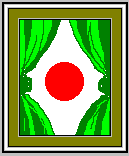| The Year-end Party |
 A Window on Japan
A Window on JapanEpisode 4
The academic system in most Japanese universities revolves around "labs", where each faculty has a lab under his name (I am in the "HIGUCHI LAB" administered by Dr.Y.Higuchi). Bachelors, masters and doctoral students, as well as research associates constitute these labs. Such a vertical integration of students creates wide interaction and discussions, besides helping us to develop a broader perspective.
December was the season for parties, and with the lab's year-end party held on 20 December, I got a glimpse of the symbolism that prevails in Japanese society. It was a traditional restaurant that we went to, replete with many very rurally artifacts etc. Dried parsimon hanging from a frame, straw slippers, old wooden closets, tiny goldfish ponds, an ancient wooden rice thresher, not to mention tatami mats... and a hundred different things like that, all very casually strewn around. You sat at a low table - squatted, really - with pillows all around. Beer flowed freely (I hate to admit it, but teetotaller that I am, all I had was soda water, probably the first one in that restaurant in a long long time).
Several rituals are followed. Of course, I haven't figured out all of them, but one of them is you should not fill your own beer glass. Someone else has to do it. And vice versa, you have to be on the look out for an almost empty glass to fill. I didn't know this when my neighbour at the party started to cough, fret and finally fiddle with his now empty glass. Then it struck me that he might have been signalling me to fill it up, particularly since the others at the table were engrossed in their conversations!! (Incidents on Japanese food will follow in separate W-on-J Episodes, since there is so much to say about it!).
But on to the symbolism. Besides a listing of all the achievements of the lab members (including my participation in a 15-km relay, where I ran three kms!), Dr. Higuchi started the cycle by taking up each student and roundly bashing him with verbal blames for various things the student did during the year (to which he had not been able to "respond" to, because it would have been too offensive). All very jovial and everyone laughed at each bashing. (I was asked to stop playing games on the computer, and concentrate on my work, ha! ha! ha!). Each student received his bashing with his head bowed and offering apologies etc. - laughter all around. And then the next cycle began, when it was Dr.Higuchi's turn to receive bashing from his lab-members. That gave the students an opportunity to pull him up on seminars, presentations, exams, grades and what have you! (No girls in our Lab, all-male, I complained) More laughter this time too. Of course, it was all supposed to be fun and a big joke. No offense offered or taken.
Being a relative outsider, and not understanding most of the proceedings (which was in Japanese) gave me a chance to reflect on what I was witnessing. This was symbolic, all right, but also an opportunity for students to vent frustrations with the faculty and vice versa, without treading on toes or creating bad feelings. (it was all a joke anyway, ha! ha! ha!). And then I realized I was also witnessing a typical Japanese institutionalized ritual: symbolic bashing. I remember reading the story of a Japanese company that has a small room beyond the locker room, where no management level personnel venture. Here hangs a dummy of the supervisor, and a nice long stick nearby. At the end of the day, before you go home, give the dummy a round bashing and vent your frustrations that way!! This is true! I just can't remember the name of the company.
On a more moderate level, this bashing takes place every day, replayed in every office at various levels of "suits". After a tough day at the office and several rounds of treaded toes (many of them start work at 7.30am or even earlier - after an hour's train ride) the immediate boss and his subordinates retire to the local pub. And guzzle gallons of beer. Now, in this intoxicated state, you can let loose your grudges on your boss (later, the next day, you can easily apologize to him saying that you were a bit drunk, and so you just laugh, ha! ha! ha! at your own drunkenness - but also having managed to put the message across that your boss' treatment of you, or the way he handled something was not "OK") - and vice versa too, I was told. Because Japanese are too polite and formal to pull up a subordinate for sloppy work. Frustrations vented, now all are friends - and ready to face the next day or, as in my case, the next year.



Go back to Episode 3
 Go on to Episode 5
Go on to Episode 5